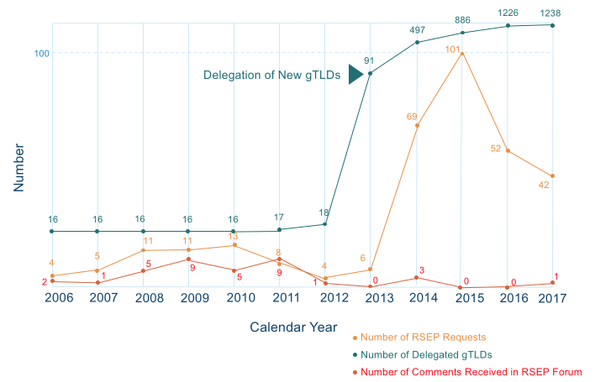Registry Services Evaluation Policy
The Registry Services Evaluation Policy (RSEP) Process is a set of protocols designed to screen and approve proposals made by gTLD operators to add or modify registry services. To submit a request for the implementation of new Registry Services, all gTLDs must take into account RSEP's provisions. The RSEP is required by ICANN in order to make sure that no significant competition issues are raised.
History edit
RSEP was created through ICANN's consensus for policy development process.[1]
On June 30, 2005, the GNSO released its PDP Final Report on the "Procedure for use by ICANN in considering requests for consent and related contractual amendments to allow changes in the architecture or operation of a gTLD registry."[2]
November 8, 2005, the ICANN Board directed that this procedure for considering requests for new Registry Services be guided by the provisions in the .net Registry Agreement, per the GNSO's recommendation, which became the Registry Services Evaluation Policy process.[3]

| Years | Requests | Factors | |
|---|---|---|---|
| 2006 | 4 | First year | |
| 2006 to 2012 | 8 on average | ||
| 2013 to 2017 | 54 on average | The increase in the number of gTLDs
Alignment of service offerings across gTLDs supported by common back-end registry service providers Requests for release of reserved names | |
| 2015 to 2017 | drop from 101 to 42 |
In 2019, RySG and ICANN org updated how to implement the policy without altering it to make it easier to understand and more predictable.
RSEP request assessment edit
When determining whether the RSEP request could raise significant competition issues, a review is necessary. The stages and steps followed are listed below:
- The General Counsel reviews the request for determining whether the RSEP request could raise significant competition issues. The following factors are taken into consideration:
- The pricing influence over the price of registry service;
- Market issues: identification of the market which could be affected, and the effects of the change;
- Allocation issues
- Impact on other markets
- Preliminary determination on competition issues by the General Council
- If no competition issues are determined, the competition review is considered complete.
- If there are significant competition issues determined by ICANN or RSEP request, the appropriate competition authority will be contacted and the jurisdiction applied.[4]
Registry Services edit
The registry services which are proposed based on RSEP requests are defined as:
- Services that are critical for the RIR (Regional Internet Registry) to perform tasks related to registrations of domain names, registrars, and other related issues.
- Other services and products that the RIR must provide based on the consensus policy adopted.
- Services which only that specific RIR is able to provide. [5]
References edit